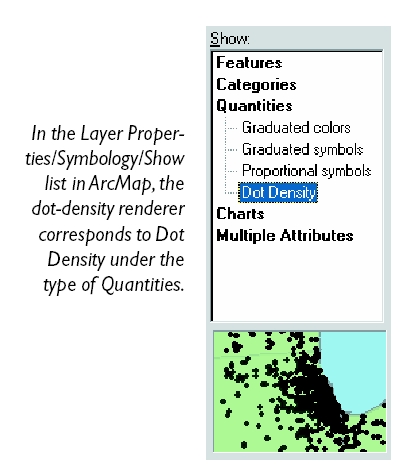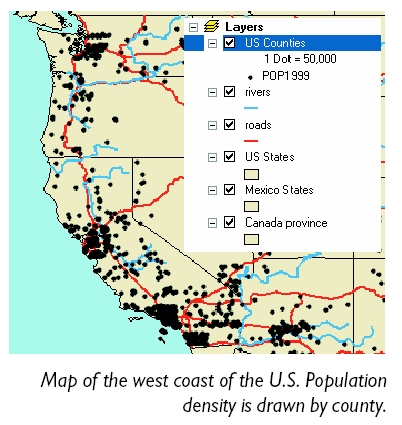 |
This document is archived and information here might be outdated. Recommended version. |
 |
This document is archived and information here might be outdated. Recommended version. |
Provides access to members that control the drawing of varying densities of dots within polygon features to represent different quantities.
Use this interface to work with the properties and methods of a DotDensityRenderer . This type of renderer draws randomly placed dots inside polygon features to represent quantitative data. Use to create dot density maps (a.k.a. dot density maps).


| Name | Description | |
|---|---|---|
 |
ColorScheme | Color scheme, (user interface property only). |
 |
ControlLayer | Control layer used for masking. |
 |
CreateLegend | Creates the legend. Call after all properties are set. |
 |
DotDensitySymbol | The dot density symbol. |
 |
DotValue | Value of each dot. |
 |
MaintainSize | Indicates if dot size is preserved when zooming (the alternative is that density is preserved). |
| Classes | Description |
|---|---|
| DotDensityRenderer | A dot density renderer. |
The DotDensityRenderer uses its DotDensitySymbol to place marker symbols randomly throughout polygon features. The number of markers placed in each polygon depends on DotValue and also the data value for the dot density field(s) specified via IRendererFields.
Though multiple fields can be mapped with a single DotDensityRenderer, typically only one field is used since a map based on multiple fields can be hard to understand.
The renderer supports a way to restrict where dots are placed within polygon features. To do this specify a polygon control layer (also known as a masking layer) via ControlLayer. An overlay is performed between the renderered layer and the ControlLayer, and you specify whether or not dots will only be placed within polygons of the ControlLayer, or only placed outside polygons of the control. Use IDotDensityMasking to set this property.
If you are building a dot density renderer via code, use IDotDensityUIRenderer to set properties of the renderer to make the user interface density previews and sliders work correctly for your renderer and data.